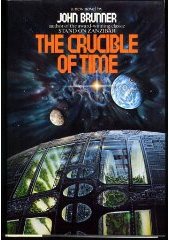Every so often people ask for science fiction novels with no humans at all. There are to my knowledge two: Cherryh’s Legacy of Chanur, in which there are no onstage humans, though a human is a significant character in the earlier books in the series, and John Brunner’s The Crucible of Time. You’d think there would be more than that—no doubt I’ve missed some.
There are no humans in The Crucible of Time. Not only that, but the aliens from whose point of view the story is presented are really alien aliens. They’re evolved from something kind of like jellyfish, they have a mantle and pith inside, they maintain pressure in their tubules, they have no rigid bones. They reproduce by sexual budding. Beyond that, they’re actually clusters of different organisms, and their natural instinct is to breed something biologically rather than to make it—their tools tend to be alive. Mentally, too, they’re unusual, their unconscious mind isn’t all that unconscious, and they can slip into madness—what they call “dreamness”—if they’re starved or overwhelmed. They communicate by speech, but also partly by pheremones—people having an argument will struggle to get the upwind position, where they’ll sound more convincing. They’re really alien aliens, but I called them people, and that’s because they are also people. It’s quite amazing that Brunner makes this work, but he does.
The other great thing about the book is that it covers a huge span of time, so the characters are constantly changing. It’s not that he makes one alien point of view work, it’s that he makes it work in the seven different sections—and some of the sections have more than one point of view. You’re constantly seeing the events of previous sections reimagined as history, or even legend.
The book is about a planet that is passing through a very active section of the galaxy that’s causing ice-ages and all kinds of planetary convulsions—the book is really about how the concept of science stays alive in culture despite natural disasters over a very long time. It’s really about how the aliens get off their planet, but you wouldn’t know that, except for the prologue, as most of it is set at very low tech levels, which seem even lower because of the biological tool-using. It’s not any one idea that’s preserved despite everything, it’s the concept of science and investigation.
Some of the individual stories are better than others, and some of the characters are more distinctive and memorable. (Some of the stories appeared first in magazines, so the book can be regarded as a fix-up, but it was always intended as one novel.) There’s an odd sentimentality about some of the stories, and considering that the book was published in 1984 you’d expect there to be a better ratio of male-to-female points of view. There are female scientists, but they’re a distinct minority.
I hadn’t re-read this for ages, and retained a really vague memory that it was all aliens and disasters (which it is…) but I was surprised how much I enjoyed it. Brunner was always good at making his characters feel real, and these characters, so different from humans, really do come alive. Their plights are interesting too. None of the individual characters stood out for me, which is why I hadn’t re-read it in a while, but the book really does give a very good sense of what it’s like to be that kind of alien. He also does a lot very cleverly with language, using words like “sourgas” and “watergas” and avoiding words redolent of our history.
The amazing thing about The Crucible of Time isn’t that it does an alien point of view, or a point of view of such very alien aliens, or that it covers such a huge span of time as the alien planet suffers so many disasters—it’s that it does them all together and makes it work as a coherent story. It’s fun.










